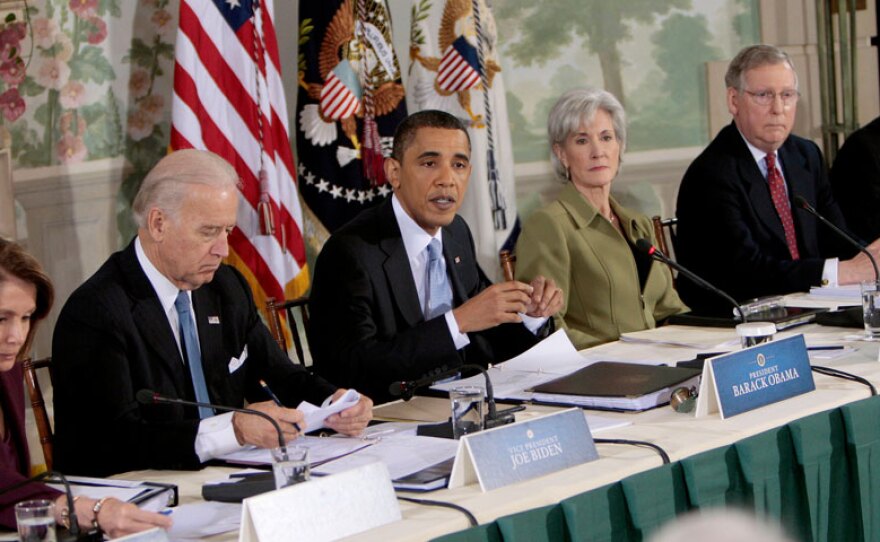President Obama's face-to-face effort to forge a bipartisan agreement on health care overhaul appeared to fall short Thursday, as differences that have plagued the process for months re-emerged during a meeting at Washington's historic Blair House.

Although Democrats maintained that the two sides were actually close to a solution, Republicans insisted that neither they nor the American people can stomach the bill as it now exists.
"Mr. President, what we've been saying for a long time is, let's scrap the bill," House Republican Leader John Boehner said. "Let's start with a clean sheet of paper on those things that we can agree on."
Obama wrapped up the nearly seven-hour session by asking Republicans to do some "soul-searching." He held out some hope that compromise could be reached and that a bill could be finalized within a month to six weeks.
"And if we can't, then I think we ought to go ahead and make some decisions, and then that's what elections are for," the president said. "We have honest disagreements about the direction of the country, and we'll go ahead and test those out for the next several months till November."
Obama brought representatives of the two parties together in a televised meeting aimed at jump-starting the overhaul and rescuing his administration's central domestic policy initiative – though some observers saw it more as a precursor to a go-it-alone strategy articulated even before the meeting by a key Democrat.
Sen. Dick Durbin said that if nothing came of Thursday's meeting, Democrats would push forward for a vote on their health care plan without Republican support.
By the time the three dozen participants had finished a sometimes contentious exchange of views, no new consensus had emerged.
Sen. Lamar Alexander, a Republican from Tennessee, began by making a pitch that Democrats need to scale back — to address the health care problem a piece at a time.
"Our country is too big, too complicated, too decentralized for Washington, a few of us here, just to write a few rules about remaking 17 percent of the economy all at once," Alexander said.
But Sen. Ron Wyden, a Democrat from Oregon, said the piece-at-a-time policy has been tried — and failed.
"The evidence says incremental reform not only does less, it costs more," Wyden said.
The effort to transform health care in the United States has been more than a year in the making. As Democrats appeared to close in on a bill they could pass, they lost a Senate seat in Massachusetts — and the possibility of a 60-vote supermajority that would force the bill to a vote.
Since then, Republican lawmakers opposed to Democratic plans have been further emboldened by public opinion that is increasingly split over the issue.
A USA Today/Gallup survey released Thursday found Americans tilt 49-42 percent against Democrats forging ahead with health care overhaul without any Republican support.
GOP leaders have pushed to scrap the Democratic plan, saying most Americans are against it. They want a fresh start based on more cost control measures and an extension of coverage to about 3 million uninsured Americans.
Obama argued that the Democratic proposal would cover 10 times that many people — though he acknowledged that the additional cost might make it a tough sell.
"It may be that the other side just feels as if, you know what, it's just not worth our doing that," he said.
Democrats still hope to pass a bill that would extend coverage to more than 30 million people who are now uninsured. But the measure would come with a price tag of $1 trillion over the next decade and include a number of complicated provisions that in some cases would take years to phase in.
The president had appealed to both sides to give him at least a modest bill, a far cry from the major changes talked up in the early days of the administration just a year ago.
Three dozen lawmakers — including 22 invited directly by the White House and others handpicked by top congressional leaders — joined several administration officials at a square table in the Blair House.
Obama, moderating the meeting, consistently sought to establish common ground. He agreed with assertions by Oklahoma Republican Sen. Tom Coburn that waste and abuse now account for up to a third of the cost of entitlement programs like Medicare and Medicaid, and constitute a major barrier to more widespread insurance coverage.
Coburn said cost is the key to why millions of Americans remain uninsured.
Rep. Steny Hoyer of Maryland, the second-ranking Democrat in the House, said he thought Coburn had a point, but said proposals by Democrats addressed the kind of cost containment that Republicans support.
In the end, many of the participants argued passionately over details and personal preferences. Topics included how to handle coverage of pre-existing medical conditions; catastrophic illnesses; and the cost of medical malpractices.
Sen. Jon Kyl, a Republican from Arizona, said the two sides "cannot paper over" the most basic of rifts:
"We do not agree on the fundamental decision about who should be in charge," he said. "We all agree on eliminating waste, fraud and abuse. Of course we do. But it's how you go about it."
Written by NPR's Scott Neuman and Deborah Tedford, with additional reporting by Scott Horsley, Julie Rovner and The Associated Press.
Copyright 2022 NPR. To see more, visit https://www.npr.org. 9(MDAzMjM2NDYzMDEyMzc1Njk5NjAxNzY3OQ001))





